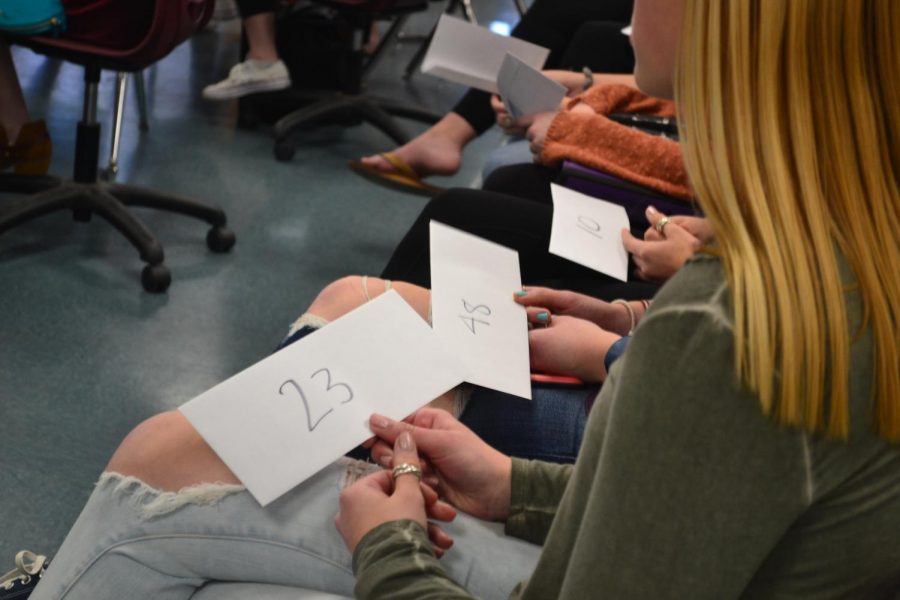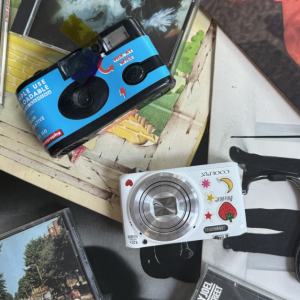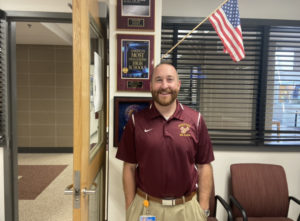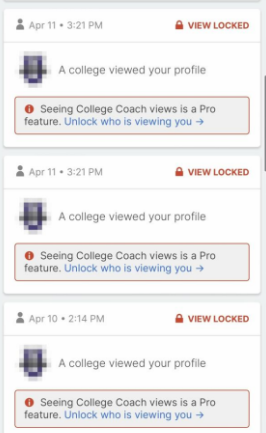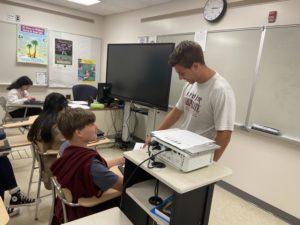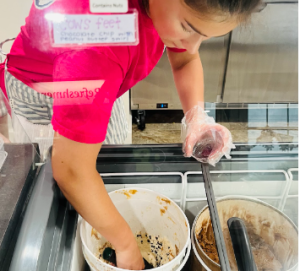Thirst Project
Members of Key Club receive their numbered envelopes which correspond to the minimum amount of money they must raise. “I have to raise $40 for the Thirsty 30 fundraiser,” Katerina Kremer (’20) said. “So far I have asked fmail members to donate to help me reach my goal, and between Gabriella and me, we have raised $70.”
March 14, 2018
Imagine instead of walking to the kitchen to get a glass of water, or going to the bathroom to shower, having to walk almost four miles just to get water. This is what women and children in areas like Swaziland are doing every day.
Key Club, an international, student-led service program for high school students, are working to relieve the problem. Women and children in water scarce areas spend six to eight hours a day hauling water from their nearest standing water source, instead of attending school or going to work. Whether the water is obtained from swamps, streams, mud puddles or earth dams, it is contaminated by diseases and feces.
Clean, safe drinking water is not available to 1.1 billion people worldwide. During the summer of 2008, this water crisis caught the attention of 19-year-old, Seth Maxwell living in Southern California. He figured out what he could do to bring awareness to this issue.
Maxwell gathered six of his friends and together they bought 1,000 water bottles with the $70 they had. They set off to the Holly Boulevard and gave away bottles at no charge in order to make people stop and question their purpose. By the end of the day they had spoken to over 1,000 people and went from having $70 to $1,700.
Maxwell and his friends used the money to fund their first freshwater well. Soon, the seven college students were traveling to schools, informing students and young people about the water crisis. This turned into what is now known as Thirst Project.
Thirst Project now has 2,217 projects in 13 countries, has served 330,863 people and has raised over $8.8 million.
“In Swaziland, we met this incredible woman named Juliet. Juliet lost most of her family to AIDS and she has AIDS. She now takes care of children in the community who have been orphaned by AIDS,” Thirst Project Road Warrior, Liel Lavie said. “When our team first met Juliet, she would walk the distance of about two football fields to a contaminated stream to collect water for herself and her family. Juliet was one of the first beneficiaries of Thirst Project’s work in Swaziland. It is amazing to see the impact on her life and the community!”
Lavie travels the country talking to middle schools, high schools and colleges to educate and raise awareness about the Global Water Crisis.
“I didn’t expect that students would be ones teaching and inspiring me!” Lavie said in an e-mail.
Over 100 celebrities including Internet stars, Connor Franta and Nash Grier as well as Disney Channel’s Cameron Boyce from “Jessie” and Monique Coleman from “High School Musical”, advocate and support Thirst Project. HBO Films has teamed with Matt Damon and Ben Afflek to create a movie called “Thrist” , dealing with the Global Water Crisis.
“We do projects on a local scale like helping the Baltimore community during the holiday time, and internationally,” President of Hereford’s Key Club Lindsey McNicholas (’18) said. She said they also support events for Project Thirst, UNICEF! and underprivileged and third world countries.
As her first year being president, McNicholas said she wanted to add something extra to the club that students after her can follow.
“I think the Thirst Project is a fantastic way to get high school kids involved with making the world a better place for those who aren’t as fortunate,” club member Nate Gernand (’20) said.
Lavie recently visited Hereford to talk to Key Club.
“I loved this project because the volunteers are so dedicated and willing to educate as many students as possible on the water crisis,” McNicholas said.
Members of Key Club are participating in a 30-day fundraising challenge called Thirsty 30. Each student receives a random envelope labeled with a number from 1 to 50 which corresponds to the dollar amount the student is responsible for raising.
“I have to raise $8 and every Sunday, we have family over and I will be asking them for at least $1 each,” club member Krishna Hipara (’20) said.
If every student reaches their goal, Key Club will raise over $1,500, and that is only from one school.
“You can make a difference, even if it’s just collecting $22,” Gernand said.
Donating $25 ensures one person safe, clean drinking water for life, $50 supports a married couple for life, $100 ensures an entire family access to clean water and for $1,200 someone is able to fund their own freshwater well and provide an entire village with clean, safe water.
“If someone is interested in joining the cause, we would love for them to,” McNicholas said. “They can bring the money in an envelope to Mrs. Blama or myself and we will be thrilled for their contribution of any amount!”
One hundred percent of donations go to Thirst Project goes directly to building freshwater wells.
“Contaminated water doesn’t only affect [people] when they drink it,” Katerina Kremer (’20) said. “They can get diseases just from touching or bathing in it.”
By 2025, half the world’s population will be living in water stressed areas.
“I never thought about people not having access to [clean] water because I’ve had it my whole life,” Hipara said. “The Thirst Project put me in a new perspective and showed me to be extremely grateful to be able to simply brush my teeth every day.”


